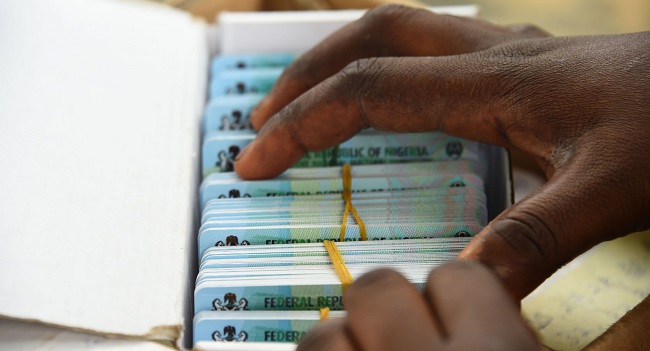By Yakubu Mohammed, WikkiTimes
A one-day trip to Gamawa to collect PVC is a luxury that Musa Yunusa, a resident of the Kadi-Kadi community in Gamawa local government area of Bauchi State, could not afford despite his willingness to vote in the 2023 polls. He makes an average of N500 daily from firewood.
Left with no means to reach Gamawa, Yunusa becomes desperate to grasp any chance that knocks at his door.
WikkiTimes gathered that traditional rulers in the area sought help from politicians to help Yunusa and others to get their voter cards.
“They gave us money and other welfare packages to mobilize people for PVC collection,” Abdullahi Saleh, Mai Anguwan Dole said, stressing that he had no idea of how their senior traditional rulers were able to source the resources being disbursed.
WikkiTimes gathered that political candidates and political parties partnered with traditional rulers in Gamawa to facilitate PVC registration for residents of remote villages in the area. They deployed different strategies to get prospective voters to pick up their voter cards.
Alhaji Ibrahim Aliyu Kesa, the PDP’s Deputy Chairman of Gamawa Local Government Area, told WikkiTimes that he was satisfied with what the party did in the area to sponsor potential voters to register with INEC.
“I cannot tell you all the strategies we used to influence the people of Gamawa to acquire their PVCs. Sometimes we give money,” he said.
For Bello Sarki Jadori who represents Gamawa at the State House of Assembly, WikkiTimes reliably gathered that he sponsored a social media team of three young and agile men who visit remote communities to enroll potential voters’ personal data into the INEC PVC registration portal before completing physical registration at the INEC office in Gamawa later in the day.
On average, the team, led by Usman Alhaji Bundujaru, captured between 50 and 60 people daily. The team went to four different communities twice each.
“Hon Jadori supported our people in rural communities of Gamawa local government with transportation fares and other logistics to visit the Gamawa INEC office to complete their voter registration,” said Musa Umar, a resident of Gamawa.
While this may appear to be a call to national duty from a neutral standpoint, the politicians and their political parties have a different agenda. They want to use this to gain cheap and undue acceptance from voters.
In Ningi, Candidates Sponsor Rural Dwellers To Register For PVC
Aspirants in Ningi local government area of Bauchi State paid residents of rural communities in the area an average of N500 daily stipend to register and get their PVCs, WikkiTimes reliably gathered.
Nazif Abdullahi Rio, Chairman of Abdul Ningi Ambassadors told WikkiTimes they expended over N1,000,000 to get people from the area registered as voters.
Abdullahi said, “we gave N500 to some rural dwellers as motivation before the concert to register with INEC. Most of them needed that kind of support before they could register.”
Ibrahim Gom, a prospective voter in Ningi who is worried about the deceptive tendencies of political candidates, said the average voter easily identified with people who offered them assistance; hence, candidates who assisted prospective voters to register and collect their voter cards after registration are more likely to have voters’ sympathy during the election than those who did not.
He said despite the assistance they received while making registration with INEC, their PVCs are safe with them, stressing that “we don’t give any data about our PVCs to anybody no matter what, but we are open to aligning with anybody who aligns with our interest.”
Dr. Hamid Adamu Muhammad, a lecturer with the Department of Mass Communication at the Federal Polytechnic, Bauchi observed that in an ideal democratic setting, aspirants jostling for various elective positions present themselves to the electorate without offering unnecessary assistance.
“The context is the overall perception of politics, standing for election, and voting in Nigeria. This is a normal thing in the Nigerian context – politicians do not see themselves fit for any elective position they aspire for if they don’t spend money,” Muhammad said.
“So, they will be looking for the slightest opportunity to make themselves look like good Samaritans to the voters,” he added.
“There is a close correlation between helping somebody secure the PVC and him or her voting for you,” Muhammad continued. “Sometimes somebody may just feel guilty. This politician is the one who helped me get this card; how can I use the same card to vote for someone else rather than him.”
This report was published with support from Civic Media Lab.
Since You Are Here, Support Good JournalismCrossRiverWatch was founded on the ideals of deploying tech tools to report in an ethical manner, news, views and analysis with a narrative that ensures transparency in governance, a good society and an accountable democracy. Everyone appreciates good journalism but it costs a lot of money. Nonetheless, it cannot be sacrificed on the altar of news commercialization. Consider making a modest contribution to support CrossRiverWatch's journalism of credibility and integrity in order to ensure that all have continuous free access to our noble endeavor. CLICK HERE |
New Feature: Don't miss any of our news again.Get all our articles in your facebook chat box.Click the Facebook Messenger Icon below to subscribe now
Text Advert by CRWatch :Place Yours
Will You To Learn How To Make Millions Of Naira Making Special Creams From Your Kitchen?.Click Here
Expose Your Business And Make More Sales. Advertise On CrossRiverWatch.com Today

